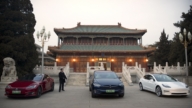【新唐人2014年07月01日訊】南中國海一些產量最大的油氣礦藏,位於馬來西亞沙巴州和沙撈越附近海域。日前,一家國際能源財團宣佈在馬來西亞海岸附近發現了天然氣資源,中共沒有做出任何回應,而馬來西亞多年來也一直在南海開採石油,中共也沒有做出任何抗議。外界認為,這種「平靜」,與中共和越南前一陣子的南海領土摩擦,形成了鮮明的對比。中共的態度差異為甚麼如此之大,下面我們一起看看。
據美國《華爾街日報》報導,目前在中國主張主權的南中國海,至少有九個油氣區塊處於開發階段,預計將在兩年內投產。這些石油開採投資者,包括荷蘭皇家「殼牌有限公司」(Royal Dutch Shell PLC, RDSB.LN)、和總部設在美國的「墨菲石油公司」(Murphy Oil Corp),以及「康菲石油公司」(ConocoPhillips, COP)。
6月22號,一家國際能源財團公布在馬來西亞海岸附近發現了天然氣資源,這一區域距離馬來西亞沙撈越海岸約144公里,恰好處於中國聲明主權的水域之內。而「墨菲石油公司」表示,他們從1999年開始,就在這個區域勘探。同時,多年來,馬來西亞也支持在這個地區進行大規模油氣開發。根據美國能源情報署的信息,馬來西亞多數天然氣田產量來自這個區域。
《華爾街日報》評論說,北京沒有對這些石油開採行為做出公開抗議,這種平靜與往北1,000公里水域上的中、越主權爭端,形成了鮮明對比。
美國《中國事務》雜誌總編輯伍凡:「是不是意味它(中共)默認了,那是你的東西,不是我的。」
時政評論員藍述:「跟越南打起來,它不會冒跟美國對立的危險,另外它也不怕越南,其他東盟國家還有其他亞太國家,你和人家鬧的衝突越厲害,人家就跟美國走的更近,選一個越南轉移視線也就罷了,它絕對不可能跟所有的這些國家都鬧對立的。」
今年初,中共在中、越都聲稱擁有主權的水域,部署了一個鑽井平臺,5月初以來,中、越兩國的海警船與漁船一直衝突不斷,越南人還焚燬了大量中國在越南的工廠。另外,據中國海事局消息,6月13號起,中國三個鑽井平臺將在南海進行鑽井作業。
藍述:「不解決爭端的話,你那個石油是拿不回去的,石油是個易燃易爆物質,那個鑽井平臺在海上就是個固定的靶子,甚麼時候都可能被人家打的,如果真想要石油的話,共同開發是個最好的辦法,它之所以這樣鬧,它實際上不是真正的想要石油,它要的是一個爭端,利用這個爭端去做文章,解決國內矛盾。」
除了越南之外,菲律賓與中國之間的主權爭議也正在日趨升溫,而在東中國海,中、日兩國戰鬥機和武裝艦船,也頻繁發生對峙。去年9月,中、日在東海釣魚島附近撞船,激發了兩國主權糾紛後,中國宣佈將把釣魚島附近海域的巡邏常態化,戰鬥機和大型轟炸機不斷飛臨中、日中間線附近,和釣魚島附近海域。
藍述:「一個是為國內的矛盾轉移視線,另外高層爭奪對軍隊的控制權,大家都在討好鷹派,所以出現了在南海,在日本這些糾紛,但是這些糾紛,它要選那些能夠挑起民族矛盾和民族仇恨的,比如日本它有侵華的歷史,這個民族仇恨很容易挑起來的。」
目前,越南和菲律賓等國家,正在尋求向北京發出更為強硬的聯合回應。以前一直站在中共一方的中國親密盟友柬埔寨也在發生變化。柬埔寨國防部人事局副局長喬薩帕中將一行,6月24號訪問了越南。喬薩帕表示,支持越南反對中國在越南海域非法架設鑽井平臺等「不法行為」的做法與立場。
《華爾街日報》引述新加坡東南亞研究所(Institute of Southeast Asian Studies)高級研究員斯託裡(Ian Storey)的話表示,面對中共一直在提升馬來西亞附近的軍事存在,馬來西亞可能將不得不重新調整南中國海政策。他還補充說,也許馬來西亞應該儘早對中國採取更強硬的立場。
採訪編輯/劉惠 後製/鍾元
Why Is China Silent On The South China Sea Oil Drilling?
“Some of the South China Sea’s most productive oil and gas
deposits are off the coast of the states Sabah and Sarawak
on Malaysia’s side of Borneo," reported
the Wall Street Journal.
An international energy consortium recently announced
the discovery of natural-gas off Malaysia’s coast.
China issued no public objections regarding
the announcement.
China has also been quiet over the years regarding extensive
Malaysian-sponsored oil-and-gas exploration and production
in the overlapping South China Sea territory.
This low profile stance on overlapping claims is in contrast
to the confrontation between China and Vietnam.
Why is there such a huge difference? Let’s take a look.
The Wall Street Journal reported that, “at least nine
oil-and-gas blocks are now under development and expected
to start pumping within two years.
Investors include Royal Dutch Shell, U.S.-based Murphy Oil
Corp. and ConocoPhillips."
An international energy consortium announced on June 22
a natural-gas discovery around 144 kilometers, or 90 miles,
off the coast of Malaysia’s state of Sarawak,
inside waters where China previously has asserted claims.
Murphy Oil said it had explored in the area since 1999.
Malaysia has also supported oil exploitation in the area.
The area is the origin of most of Malaysia’s natural-gas
production, according to the U.S. government Energy
Information Administration.
WSJ commented that, “the lack of confrontation is in contrast
with the jousting 1,000 kilometers to the north between China
and Vietnam, where coast-guard and fishing vessels
have faced off since early May."
Chris Wu, China Affairs magazine editor in chief:
“Does it mean the Chinese Communist Party (CCP)
acknowledges the announcement?"
Commentator Lan Su: “It will not risk confronting the U.S.
by engaging in a battle with Vietnam.
It does not care about Vietnam either.
The more conflict there is with other ASEAN countries
as well as other Asia-Pacific countries, the more
these countries will get closer to the US.
Vietnam was chosen to divert attention. That was it.
It will not oppose the rest of these countries."
Earlier this year, the CCP deployed a rig in an area claimed
both by both China and Vietnam.
Since early May, coast-guard and fishing vessels
between both countries have faced off, domestic protests
resulting in destruction of Chinese owned factories
by rioters in Vietnam.
Meanwhile, China Maritime Safety Administration announced
three drilling rigs in the South China Sea will begin
operating on June 13.
Lan Su: “The dispute must be resolved, otherwise the oil will
not leave. The oil is flammable, and the rigs are fixed targets
which can be destroyed at anytime.
Joint development is the best way to retrieve the oil.
The CCP engages in conflict with a purpose.
It can be used to resolve its domestic conflicts."
Furthermore, “sparring over rival claims by the Philippines
and Chinais becoming increasingly heated, while in the East
China Sea, Chinese and Japanese fighter planes and armed
vessels frequently circle each other in asserting overlapping
claims," wrote WSJ.
Last September, collision near the Diaoyu Islands inspired
the sovereignty dispute between the two countries after China
announced that it would routinely patrol the waters
near the Diaoyu Islands, with fighter planes and bombers
in the disputed area.
Lan Su: “It is to divert domestic conflicts, and to please
the hawks for control of the armed forces.
That is the reason why there is conflict
in the South China Sea and with Japan.
The conflict has to be able to provoke ethnic conflicts
and ethnic hatred.
With the evasion history of Japan to China,
the ethnic hatred is easy to manipulate."
“Individual nations, such as Vietnam and the Philippines,
have sought a tougher collective response to Beijing.
Meanwhile, Cambodia—a close ally of China—has sided
with Beijing in previous Asean discussions on the disputes,"
said the WSJ article.
In his recent visit to Hanoi, Lieutenant General Khieu Saphat,
Deputy Director of the Personnel Department
of the Cambodian Ministry of National Defense, expressed
his support for Vietnam by objecting to China’s unlawful
actions in the East Sea.
WSJ quoted Ian Storey, senior fellow at the Singapore-based
Institute of Southeast Asian Studies, “Malaysia may have
to recalibrate its South China Sea policy."
He added, “Perhaps sooner rather than later Malaysia
may have to take a tougher line against Beijing."
Interview & Edit/Liu Hui Post-Production/Zhong Yuan



























